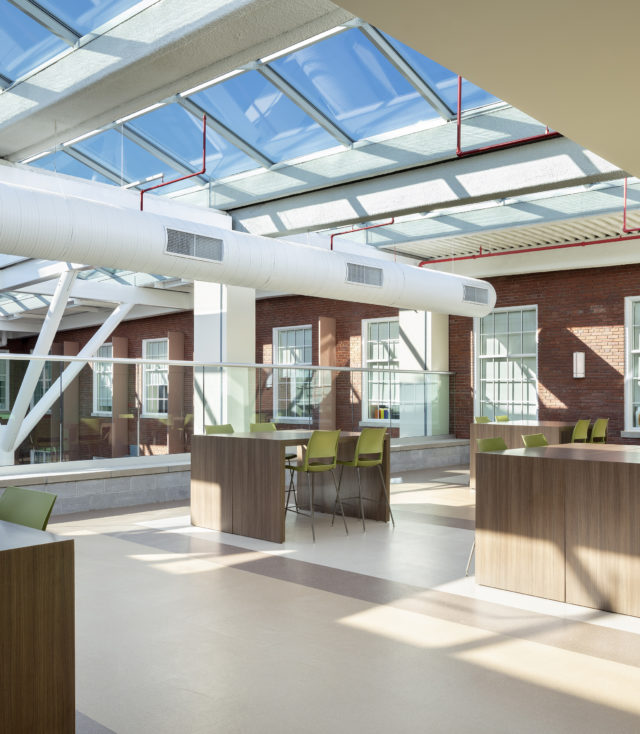Insights
Maintaining School HVAC Systems to Address COVID-19
By Timothy Lehman and Mark Hopf
The question came from a school client:
“What should we be doing with our HVAC systems to be proactive regarding the COVID-19 coronavirus?”
We shared our answer as quickly as possible. And in the hope that it will help other school and university clients, we are publishing that answer on our website.
On February 27, the American Society for heating, Refrigerating and Air-Conditioning Engineers came out with guidance related to COVID-19. It recommends a focus on:
- Supplying clean air to susceptible occupants
- Containing contaminated air and/or exhaust it to the outdoors
- Diluting the air in the space with clean and filtered outdoor air
- Cleaning the air within a room
Based on our own in-house knowledge and the recommendations of ASHRAE, here are some steps you can take to be proactive about the COVID-19 coronavirus.
Bring More Outside Air Into Your Buildings
We will discuss filters and maintenance procedures in a moment. But first we want to be clear: There is no filter or building system feature that is proven to remove COVID-19 or any other airborne infectious disease from the air. Our best recommendation is to use outdoor air to dilute indoor contaminants.
Some HVAC systems control the amount of outdoor air flow based on the demand. For example, your gymnasium HVAC system may bring in less outdoor air when it is at a reduced occupancy. This energy-savings measure makes sense in a typical situation. However, the spread of the coronavirus is not a typical situation. Consider asking your HVAC vendor or your engineering consultant to stop the demand control ventilation for now. Setting your system to design outside airflow will maximize the amount of clean air in the building.
Another possibility would be to “purge” the building by bringing in more outside airflow than required. The best time for this to occur would be during unoccupied hours, as your HVAC system is most likely not designed to maintain temperature and humidity setpoints with this amount of outside air. Make sure you talk to a building system or mechanical engineering professional before taking action.
Turn on Your Ultraviolet Lights
If your air handling units have ultra violet lamps, make sure they are turned on and operational. According to the Environmental Protection Agency, HVAC systems with ultraviolet germicidal irradiation cleaners may destroy pollutants such as viruses and bacteria. While this isn’t a sure thing, now would be the time to have your UV lamps operating as designed.
Increase Maintenance Procedures Focused on Delivering Clean Air
While new filters won’t stop the spread of infectious disease, dirty or ineffective filters can exacerbate underlying respiratory issues that make occupants more vulnerable to COVID-19. We recommend focusing your near-term maintenance procedures in three key areas:
- Replace air handling unit filters on a regular and consistent basis. If you haven’t changed your filters recently, now is the time to do it.
- Look at increasing the Minimum Efficiency Rating Value (MERV) rating of your filters. The higher the rating, the more airborne particulates you will capture. However, these filters are more expensive and you will need to change them more often.
- Wipe down the inside of your air handling unit cabinets. When doing this, be careful with cleaning the coils. Using the wrong cleaning products or procedures can damage the coils and/or void your warranty. Consult the unit manufacturer for proper cleaning products and procedures.
Consult Government Agencies for the Latest Guidance
There is no way to completely prevent the spread of the coronavirus COVD-19 in K-12 and university buildings. Proper maintenance and building operation strategies will help, but please reference the World Health Organization, the Center for Disease Control and other government agencies for the latest guidance on washing your hands, cleaning surfaces and staying home when sick.
In the meantime, please be careful and stay safe.
Resources:
Creating Ideal Montessori School Environments: A Guide for Architects and Educators
By Carla RemenschneiderMontessori schools are designed to foster independent learning, exploration and creativity in children. As an architecture, interiors and engineering firm, Fanning Howey understands the importance of designing physical spaces that support these principles. By thoughtfully
Full ArticleEsports Facilities for Student Engagement
By Steven HerrAs competitive esports becomes a viable career path, educators across the country are embracing these gaming trends and expanding esports programming at their schools. Schools that have adopted esports are already seeing the benefits. According
Full ArticleCareer Technical Education – Designing a Professional Welding Lab
By Douglas Rich“Career Technical Education (CTE) provides students of all ages with the academic and technical skills, knowledge and training necessary to succeed in future careers and to become lifelong learners. In total, about 12.5 million high school
Full Article